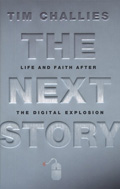 |
The Next Story: Life and Faith after the Digital Explosion by Tim Challies Zondervan, April 2011 208 pp., $12.99 |
Blogger Tim Challies understands both technology’s potential and its potential seduction. He uses emerging tools to keep his 15,000 visitors updated daily at Challies.com. His new book, The Next Story: Life and Faith after the Digital Explosion (Zondervan), considers our reliance on technology and how it impacts our faith. Matthew Lee Anderson spoke with Challies about how Christians might think theologically about technology.
You write that we are “molded and formed into the image of what shapes us.” What risks do technologies like Facebook and YouTube pose to the Christian life?
When technologies give us an ability, they also give us a desire. Before Twitter or Facebook, none of us cared about moment-by-moment updates from friends. But with the new tools, we’ve grown to desire—and sometimes even demand—that sort of information. YouTube heightens and preys upon our desire to see and be seen. It makes us exhibitionists, telling us that any part of the human experience can be someone’s entertainment.
You point out that the “new Calvinists” gained influence by adopting technology. How do you see those tools shaping the movement?
You can’t really understand new Calvinism apart from the Internet. It allowed us to hear from these people in an unprecedented way.
We seem to have short attention spans, and much of what we’re learning and hearing comes through social media. Far more people are getting John Piper in 140-character chunks than are listening to his 45-minute sermons, which means we’re not learning in more holistic ways.
Is a specifically Reformed understanding of technology possible?
If it is, I don’t know that I want to major in it. But certainly, I am Reformed in my understanding of God’s sovereignty over all creation and my heightened sense of human depravity. A Reformed understanding would take into account God’s sovereignty even over technology as the starting point and ending point. God saw fit to allow us technology, and God cares how we use it. Our job is to ensure that we’re using technology in a way that’s subject to his authority.
Does the emphasis on depravity lead to a stronger sense of caution or skepticism toward new technologies?
I think Reformed theology causes us to expend more effort understanding our sinfulness. That might give us a different starting point when we look at technology. We might have more reasons to doubt ourselves, but we also need a heightened sense of God’s sovereignty.
You seem ambivalent about the “rise of the images,” which some Christians have praised for creating a more holistic, less rationalistic faith than the print culture brought about. How should Christians relate to images?
The Christian faith is carried by words. Jesus Christ is not the picture—he’s the Word. And we have to acknowledge that God saw fit to record Scripture for us in words. We don’t have to fear images, but we should be wary of them.
The promise of the Internet was universality. You emphasize the role geography plays in the formation of our communities. What role should distance and proximity play in choosing a church?
The problem actually goes back to the automobile, which gave people the opportunity to attend commuter churches rather than community churches. The ability to attend church a long ways away forced people to rethink church.
But in a world shaped by the Internet, people find their hearts drawn to churches a thousand miles away rather than a short drive away. As a result, they relate to people through chats and forums rather than face to face. It leads to a very mediated form of church community.
You defend the role of authority in culture against the “radical egalitarianism” that the Internet promises. Do you think this egalitarian ethos undermines biblical authority?
The Internet has certainly flattened authority. We don’t care about book reviews from experts anymore as much as we care about the quality of reviews. If we see authority flattened online and everywhere else, we expect to see authority flattened in the home and the church. The ideology of digital technology is this disruption of hierarchy, so we import that into other areas.
It seems clear from Scripture that authority is built into human experience, that God intends for there to be hierarchy. We should celebrate authority and use caution toward anything that might disrupt it. At the same time, there is not necessarily anything wrong with particular authority structures being dismantled. The idea that we make decisions based on more amateur book reviews isn’t necessarily wrong, but it is noteworthy.
In the final section, you mention using tools to help you focus more. What’s the problem with that?
We tend to think that when technology causes a problem, the best way to solve it is with more technology. It’s fine to get rid of technology or become less dependent on technology. But we shouldn’t assume that there is another technology that can bring peace where we’re finding conflict.
Copyright © 2011 Christianity Today. Click for reprint information.
Related Elsewhere:
Previous articles on technology and faith from Christianity Today and sister publications include:
Church … Virtually | Why internet campuses are making us reconsider our assumptions about ministry. (Leadership Journal January 4, 2010)
From the Printing Press to the iPhone | Shane Hipps urges Christians to discern the technology spirits. (May 6, 2009)
People of the Nook | What Bible smartphone apps tell us about the Book. (May 16, 2011)









